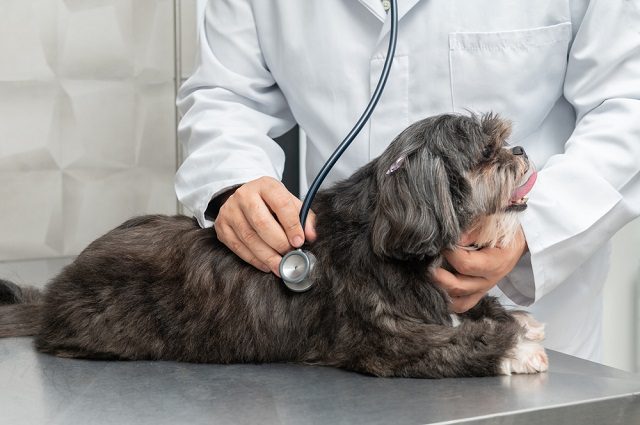Shih Tzu Breathing Odd? 5 Shocking Reasons!
Imagine your sweet Shih Tzu, with its adorable fluffy face and wagging tail, suddenly struggling to breathe. It can be terrifying to see your furry friend not breathing normally. Knowing what might be causing these breathing problems is essential for a Shih Tzu owner. Sometimes, it could be something as simple as a cold or more serious.
In this article, we’ll dive into five surprising reasons why your Shih Tzu might be breathing oddly and what you can do to help. Understanding these issues can significantly affect your pet’s health and happiness. Let’s get started!
Reason #1: Respiratory Infections
Respiratory infections are frequent for dogs, including Shih Tzus, and they can seriously impact how your pet breathes. Like people, dogs can catch infections affecting their lungs and airways. For Shih Tzus, common respiratory infections include kennel cough, pneumonia, and bronchitis.
- Kennel Cough: This highly contagious infection often spreads in places where dogs gather, like kennels or parks. Both bacteria and viruses trigger kennel cough, which symptoms include a dry, harsh cough, sneezing, and nasal discharge. Your Shih Tzu might also seem less active or have a reduced appetite.
- Pneumonia: Pneumonia is an infection that inflames the lungs, making it hard for your Shih Tzu to breathe comfortably. This condition can be caused by bacteria, viruses, or even inhaled foreign objects. Signs of pneumonia include coughing, difficulty breathing, fever, and lethargy. Your Shih Tzu might also breathe rapidly or make unusual noises when breathing.
- Bronchitis: Bronchitis is inflammation of the airways, which can be triggered by infections, irritants, or allergies. It often leads to persistent coughing, wheezing, and mucus buildup in the airways. Chronic bronchitis can make breathing difficult and uncomfortable for your Shih Tzu.
These infections can be caused by various factors, including exposure to bacteria or viruses, changes in weather, or poor ventilation in your pet’s environment. If you notice any signs of a respiratory infection, such as nasal discharge, a fever, or a persistent cough, it’s essential to consult your veterinarian immediately. Your veterinarian can conduct tests to identify the source of the infection and prescribe appropriate medication to aid your Shih Tzu’s recovery. Early treatment is vital in easing symptoms and preventing more serious health issues.
Reason #2: Brachycephalic Obstructive Airway Syndrome (BOAS)
Brachycephalic Obstructive Airway Syndrome, or BOAS, is ubiquitous in dog breeds with adorable short noses and flat faces, like your Shih Tzu. This condition results from the unique structure of their skulls and airways, which can lead to blocked airflow and make it challenging for them to breathe.
- Understanding BOAS: In Shih Tzus, airway obstruction typically occurs because of narrow nostrils, an elongated soft palate, or a small trachea. These anatomical differences can restrict airflow into the lungs, causing your pet to struggle to breathe.
- Symptoms to Watch For: The signs of BOAS are hard to miss. You might hear your Shih Tzu making noisy, high-pitched breathing sounds, even when resting. Snoring loudly and panting excessively, especially after just a little activity, are also common indicators. These symptoms can become more pronounced in hot weather or intense exercise, leading to severe breathing difficulties.
If you notice these symptoms, seeking advice from a veterinarian familiar with brachycephalic breeds is crucial. Early intervention is essential in managing BOAS effectively.
Your vet might suggest several approaches:
- Lifestyle Adjustments: Keeping your Shih Tzu cool and avoiding strenuous exercise can help manage the symptoms. Maintaining a healthy weight is also important, as obesity can exacerbate breathing difficulties.
- Surgical Options: For some Shih Tzus, surgery might be necessary to widen the nostrils or shorten the soft palate, significantly improving airflow and enhancing your pet’s quality of life.
- Ongoing Management: Managing BOAS is a lifelong commitment. Regular check-ups with the vet, monitoring your Shih Tzu’s breathing, and adjusting care as needed are essential parts of ensuring your pet stays happy and healthy.
Understanding BOAS and taking proactive steps can help your Shih Tzu breathe more manageably and lead a more comfortable life. If you suspect your Shih Tzu has BOAS, don’t wait—get in touch with your vet for an evaluation and tailored advice on the best interventions for your furry friend.
Reason #3: Allergies and Environmental Factors
Allergies are a common issue that can significantly affect your Shih Tzu’s ability to breathe easily. Various environmental factors can trigger allergic reactions, making it challenging for your pet to enjoy an everyday, comfortable life.
Common Allergens
Several common allergens can impact your Shih Tzu, including:
- Pollen: Like humans, pollen can cause seasonal dog allergies, leading to respiratory distress.
- Dust Mites: These tiny creatures thrive in warm, humid environments and can provoke allergic reactions.
- Mold: Mold spores can be inhaled and trigger allergic responses, which include respiratory symptoms.
- Household Chemicals: Air fresheners, cleaning products, and even some types of paint can release fumes that irritate sensitive dogs.
Symptoms of Allergic Reactions
The symptoms of allergies in Shih Tzus vary but typically include coughing, sneezing, wheezing, and difficulty breathing. You might also notice your dog rubbing their face, or they may have watery eyes or a runny nose. These symptoms can escalate to more severe breathing difficulties without proper management.
- Managing Allergies: To help your Shih Tzu cope with allergies, consider the following steps:
- Reduce Exposure: Keep windows closed during high pollen days and clean your home regularly to reduce dust and mold buildup.
- Air Purifiers: Installing air purifiers in your home can help remove allergens and relieve your pet.
- Hypoallergenic Bedding: Use hypoallergenic bedding and wash it frequently to keep dust mites at bay.
- Veterinary Care: If you think your Shih Tzu may have allergies, consult your veterinarian. They can conduct allergy tests to pinpoint specific triggers and recommend appropriate treatments, including antihistamines, corticosteroids, or even allergy shots tailored to your dog’s needs.
By understanding the potential allergens and taking proactive steps to minimize exposure, you can help alleviate the symptoms of allergies in your Shih Tzu, improving their respiratory health and overall quality of life. Regular check-ins with your vet are essential to manage this condition and adjust treatments effectively.
Reason #4: Heart Conditions
Heart conditions are serious health issues that can drastically affect your Shih Tzu’s ability to breathe normally. Whether due to congenital defects, age-related wear, or infectious causes like heartworms, heart disease can be a significant concern for any pet owner.
Common Heart Conditions in Shih Tzus
- Congestive Heart Failure (CHF): It occurs when the heart isn’t pumping blood effectively, causing fluid to back up in the lungs and leading to labored breathing and coughing.
- Heartworm Disease: Heartworms, transmitted by mosquitoes, are a serious concern. They live in the heart and lungs and can cause severe lung disease, heart failure, and other organ damage.
Symptoms to Watch For
- Early detection of heart problems can be life-saving. Symptoms that might indicate a heart condition include:
- Rapid Breathing: Pay attention if your Shih Tzu’s breathing becomes fast and shallow, even when resting.
- Lethargy: Low energy or reluctance to exercise can indicate heart disease.
- Persistent Cough: A cough that doesn’t go away could be linked to fluid accumulation around the lungs.
- Fainting or Collapse: These dramatic symptoms can occur if the heart isn’t pumping enough blood to the brain.
Diagnosis and Treatment
- Veterinary Examination: Taking your Shih Tzu to the vet is critical without delay if you notice any of the above symptoms. The vet will likely listen to your pet’s heart and may detect murmurs or irregularities.
- Diagnostic Tests: To confirm a diagnosis, your vet may recommend X-rays or an echocardiogram to visualize the heart’s structure and function. Blood tests and other diagnostics can also help assess overall heart health.
- Treatment Options: The treatment approach can differ based on the severity of the heart condition. It may include medications to improve heart function, diuretics to reduce fluid buildup, and, in some cases, surgical interventions. Lifestyle changes such as a low-sodium diet and regulated exercise will also be crucial.
- Ongoing Management: Managing a heart condition is a lifelong commitment that involves regular veterinary checkups to monitor the progression of the disease and adjust treatment as necessary. With proper care and attention, Shih Tzus, with heart conditions, can continue to lead happy, fulfilling lives.
Understanding the impact of heart conditions on your Shih Tzu’s breathing and overall health allows you to support your pet through effective management and care strategies. Always consult your veterinarian for guidance tailored to your Shih Tzu’s specific needs.
Reason #5: Obesity and Physical Fitness
Obesity is a significant health issue for dogs, including Shih Tzus, and it can significantly affect their breathing and overall well-being. Carrying extra weight puts a lot of stress on a dog’s body, especially on the respiratory and cardiovascular systems, making it harder for them to breathe and stay active.
How Obesity Affects Breathing
- The strain on the Respiratory System: Extra body fat can physically compress the chest and lungs, restricting the ability to take deep breaths. This can result in difficulty breathing, especially during exercise or hot weather.
- Aggravation of Other Conditions: Overweight Shih Tzus may also suffer worsened symptoms if they have other conditions like BOAS or heart issues, compounding their breathing difficulties.
Maintaining a Healthy Weight
- Proper Diet: It’s crucial to feed your Shih Tzu a balanced diet appropriate for its age, size, and activity level. Consult your veterinarian to find the optimal diet and portion sizes to help your pet lose or maintain a healthy weight.
- Regular Exercise: Regular, gentle exercise can help your Shih Tzu shed excess pounds and improve cardiovascular health. Activities could include short walks, play sessions in the yard, or light indoor games that don’t overexert your pet but keep them moving.
Benefits of Physical Fitness
- Improved Respiratory Efficiency: As your Shih Tzu gets fitter, their body becomes more efficient at oxygen use, and breathing becomes more manageable.
- Increased Stamina and Energy: Regular activity helps build stamina. Over time, your Shih Tzu can play and move around more without getting winded.
- Enhanced Overall Health: Exercise not only aids in weight management but also contributes to better mental health, reducing anxiety and depression in pets.
Creating a Fitness Plan
Customizing your Shih Tzu’s exercise regimen to their specific needs is crucial. Start slow, primarily if your pet is not used to regular activity, and gradually increase the intensity and duration of the workouts as they become more fit. Always watch your Shih Tzu during exercise to ensure they are not struggling or showing signs of distress.
Obesity can profoundly impact your Shih Tzu’s quality of life, but with the proper diet and exercise plan, you can help them achieve a healthier weight and better breathing capacity. Regular check-ups with your vet will help track your Shih Tzu’s progress and adjust their health plan to ensure they remain happy and healthy.
When to Seek Veterinary Help
Even small changes in your Shih Tzu’s breathing can sometimes signal a more significant health issue. It’s crucial to stay observant and know when these signs might require a trip to the veterinarian.
Signs to Watch For
- Persistent Breathing Changes: If your Shih Tzu’s breathing pattern changes for an extended period or seems effortful, it’s a sign that something might be wrong.
- Signs of Distress: Look for symptoms like gasping for air, blue-tinted gums, or a constant open-mouth breathing stance. These can all be indications of respiratory distress.
- Other Alarming Symptoms: Alongside breathing difficulties, symptoms like unusual lethargy, reluctance to move, loss of appetite, or sudden weight changes are red flags that your pet needs medical attention.
The Importance of Prompt Veterinary Care
- Early Detection: Consult your vet when you notice any worrying signs to catch potential health issues early. Early detection typically results in more successful treatment.
- Accurate Diagnosis: Vets can perform various diagnostic tests, from simple physical examinations to X-rays and blood tests, to determine the exact cause of your Shih Tzu’s breathing troubles.
- Tailored Treatment Plans: Once a diagnosis is made, your vet can create a treatment plan that may include medications, lifestyle changes, or other therapies tailored to your Shih Tzu’s specific needs.
Routine Check-Ups
- Regular Health Monitoring: Regular check-ups, even when your Shih Tzu seems healthy, are essential for maintaining their overall well-being. These visits can help your vet spot early signs of illness you might miss.
- Preventive Care: Regular veterinary visits also allow for ongoing preventive care, including vaccinations, parasite control, and dental care, all of which can contribute to your Shih Tzu’s long-term health.
It’s always better to err on the side of caution and consult with your veterinarian if you’re unsure about your Shih Tzu’s health. Keeping a close eye on any changes and maintaining regular vet visits can help ensure your beloved pet remains healthy and vibrant.
Conclusion
Monitoring your Shih Tzu’s breathing is essential for their health. We’ve discussed several key issues impacting their well-being: respiratory infections, BOAS, allergies, heart conditions, and obesity.
- Act on respiratory symptoms promptly to prevent complications.
- Manage BOAS with lifestyle changes or surgery for better comfort.
- Reduce allergens to ease breathing difficulties.
- Address heart issues quickly to enhance your pet’s life.
- Maintain a healthy weight for overall health and easier breathing.
Stay proactive with regular vet check-ups and respond quickly to any changes in your Shih Tzu’s health. This vigilance ensures that your Shih Tzu leads a happier, healthier life.
FAQ,s
What are common signs of respiratory infections in Shih Tzus?
Look for symptoms like persistent coughing, nasal discharge, fever, and lethargy. If these persist, it’s essential to seek veterinary care.
How can I tell if my Shih Tzu has BOAS?
Symptoms of BOAS include noisy breathing, snoring, and excessive panting, especially after minimal activity or in hot weather.
What should I do if allergies affect my Shih Tzu’s breathing?
Reduce exposure to potential allergens and consult your veterinarian for allergy testing and appropriate treatments.
How do heart conditions affect a Shih Tzu’s breathing?
Heart conditions can lead to rapid, labored breathing, coughing, and lethargy. If you observe these symptoms, contact your veterinarian right away.
Why is maintaining my Shih Tzu’s ideal weight essential?
Excess weight can strain the respiratory and cardiovascular systems, making it harder for your Shih Tzu to breathe and stay active.










